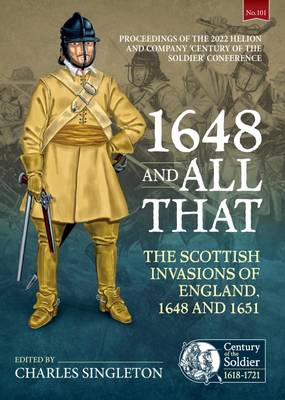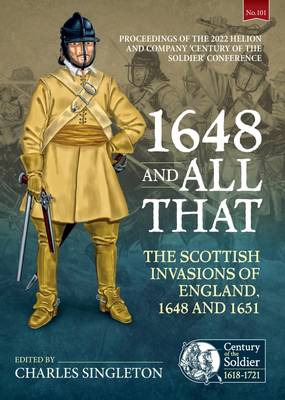
- Afhalen na 1 uur in een winkel met voorraad
- Gratis thuislevering in België vanaf € 30
- Ruim aanbod met 7 miljoen producten
- Afhalen na 1 uur in een winkel met voorraad
- Gratis thuislevering in België vanaf € 30
- Ruim aanbod met 7 miljoen producten
Zoeken
1648 and All That
The Scottish Invasions of England, 1648 and 1651. Proceedings of the 2022 Helion and Company 'Century of the Soldier' Conference
€ 34,95
+ 69 punten
Omschrijving
The resumption of conflict between 1648 and 1651 is frequently referred to as the Second and Third Civil Wars. The period marked not only a return to war, but to a bloodier, more violent conflict that had perhaps been seen before in the British Isles. Massacre, summary executions, wonton destruction and assault on the civilian population were commonplace. In early 1648 a political faction called the 'Engagers' gained control of the Scottish Government and sent an army into England to support numerous pro-Royalist risings across the country. Poorly equipped and trained with low morale, the Scottish 'Engager' Army and its Royalist allies were no match for the New Model Army led by Cromwell. The two sides met at Preston in August 1648 and after an initial clash, the Scots finally surrendered at Warrington two days later.
Following the execution of Charles Ist in January 1649, the Scots supporting his son Charles IInd went to war against England, now a republic. A second invasion of England was launched, and the Scots found themselves corned at Worcester by English forces, once again led by Oliver Cromwell. The battle, the last major action of the British Civil Wars was fought on the 3rd September 1651, was described by Cromwell as 'a crowning mercy'.
The venue for the 2022 conference was Worcester Cathedral. The obvious theme for the conference was the Scottish invasions of England in 1648 and 1651. Not only did Worcester witness the last major battle of the British Civil Wars, but the Cathedral was used as a temporary prison to hold the Scottish prisoners.
The papers in this book of proceedings include:
Ronald Hutton - Key Note Speaker and Foreword
Stuart Jennings - Colonel Francis Thornhagh and the Battle of Preston, 1648
Peter Gaunt - A Tale of Two Risings: Was the second civil war in England and Wales
primarily pro-Royalist or anti-Parliamentarian?
Malcolm Wanklyn - The Control of Command in the British Wars 1642-1651
Edward Furgol - Three armies into one? Scottish Engager military organization in 1648
Following the execution of Charles Ist in January 1649, the Scots supporting his son Charles IInd went to war against England, now a republic. A second invasion of England was launched, and the Scots found themselves corned at Worcester by English forces, once again led by Oliver Cromwell. The battle, the last major action of the British Civil Wars was fought on the 3rd September 1651, was described by Cromwell as 'a crowning mercy'.
The venue for the 2022 conference was Worcester Cathedral. The obvious theme for the conference was the Scottish invasions of England in 1648 and 1651. Not only did Worcester witness the last major battle of the British Civil Wars, but the Cathedral was used as a temporary prison to hold the Scottish prisoners.
The papers in this book of proceedings include:
Ronald Hutton - Key Note Speaker and Foreword
Stuart Jennings - Colonel Francis Thornhagh and the Battle of Preston, 1648
Peter Gaunt - A Tale of Two Risings: Was the second civil war in England and Wales
primarily pro-Royalist or anti-Parliamentarian?
Malcolm Wanklyn - The Control of Command in the British Wars 1642-1651
Edward Furgol - Three armies into one? Scottish Engager military organization in 1648
Specificaties
Betrokkenen
- Uitgeverij:
Inhoud
- Aantal bladzijden:
- 122
- Taal:
- Engels
- Reeks:
Eigenschappen
- Productcode (EAN):
- 9781804513644
- Verschijningsdatum:
- 11/04/2023
- Uitvoering:
- Paperback
- Formaat:
- Trade paperback (VS)
- Afmetingen:
- 180 mm x 249 mm
- Gewicht:
- 340 g

Alleen bij Standaard Boekhandel
+ 69 punten op je klantenkaart van Standaard Boekhandel
Beoordelingen
We publiceren alleen reviews die voldoen aan de voorwaarden voor reviews. Bekijk onze voorwaarden voor reviews.










